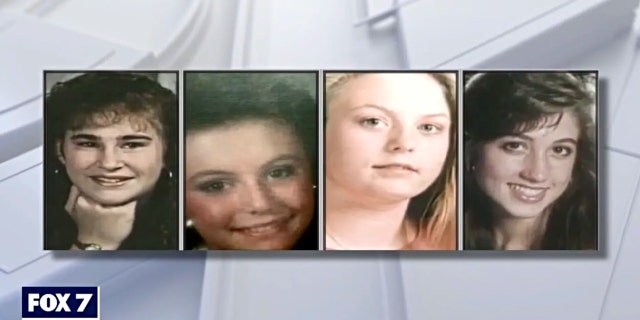NEWYou can now listen to Fox News articles!
President Biden signed a bipartisan cold case investigation bill into law this week that establishes federal rights for the relatives of people killed in unsolved murders.
The Homicide Victims’ Families Rights Act provides family members of cold case victims a way to officially request federal investigators review their case with the latest available technology – and it specifically prohibits previous investigators from leading the renewed probe.
It also instructs agencies to keep families updated on the case file and will require the federal government to publish annual statistics on cold case murders beginning in 2025.
Two former prosecutors turned congressmen, Reps. Michael McCaul, R-Texas, and Eric Swalwell, D-California, introduced the bill, which passed 406-20 in the House and unanimously in the Senate.
President Joe Biden signs bills on Friday, Aug. 5, 2022, at the White House in Washington.
(AP Photo/Evan Vucci, Pool)
McCaul has cited the unsolved 1991 “Yogurt Shop Murders” as a major factor in his efforts to pass the law.
“Three decades ago, four girls were brutally murdered at an Austin, Texas, yogurt shop, still haunting their families and community because the case remains unsolved,” McCaul told Fox News Digital Friday. “I’m hopeful the Homicide Victims’ Families Rights Act will deliver the resources to help solve cold cases providing hope, justice, answers, and closure to grieving families of those whose cases have gone cold.”
The cold case killings left four teen girls dead: 13-year-old Amy Ayers, 17-year-old Eliza Thomas, 15-year-old Sarah Harbison and her 17-year-old older sister Jennifer Harbison.

Photos of the “Yogurt Shop Murders” victims, who were killed in a horrific 1991 attack that remains unsolved.
(FOX 7 Austin)
The younger girls were visiting the older two, who worked at the shop. All four were later found bound and gagged, with gunshot wounds to their heads, and the shop had been set on fire.
Four men were soon arrested – but the charges were later dropped after DNA evidence linked an unknown man to the scene.
He has not been identified.

Rep. Michael McCaul, R-Texas, speaks at a news conference on Capitol Hill in Washington, Tuesday, June 15, 2021. (AP Photo/Andrew Harnik)
(AP/Andrew Harnik)
McCaul, former Texas deputy attorney general and former federal prosecutor, sent a letter to the FBI in 2019 asking the bureau to provide DNA samples from the case for a Y-STR matching test, but the FBI said the test would result in thousands of matches and be rendered inconclusive.
The new law requires federal law enforcement agencies to review a cold case upon a written request from a victim’s immediate family, if the case is still “cold” after three years and has probative leads. The new legislation requires the federal government to inform family members of cold case victims of their right to do so.
Then the agency must “determine if a full reinvestigation would result in either the identification of probative investigative leads or a likely perpetrator.”
JONBENET RAMSEY COLD CASE: DNA EXPERT EXPLAINS HOW MYSTERY MIGHT BE SOLVED IN SHORT ORDER
“Far too many homicides in our country are going unsolved, leaving families and communities devastated,” Swalwell said in a statement.
READ THE BILL HERE:
PENNSYLVANIA MAN CHARGED IN 1975 COLD CASE KILLING OF TEENAGE WOMAN
Joseph Giacalone, an adjunct professor at New York City’s John Jay College of Criminal Justice and the former commanding officer of the NYPD’s Bronx Cold Case Squad, said unsolved cold cases mean a risk of additional violence. Especially when the perpetrators are serial killers or responsible for gang or drug-related slayings, he said, and as many as 39% of homicides result in no arrests each year.
He said that as an investigator he took pride in helping victims’ families find closure.
“We’re finally seeing elected officials get it right: Victims matter; victims’ families matter,” he said. “This is exactly what people like myself have been screaming about over the last two years during the progressive era of criminal justice: that victims have been forgotten, and the families. This is a step in the right direction.”
FLORIDA SERIAL KILLERS CHARGED IN PAIR OF 1983 RAPE AND MURDER COLD CASES
Giacalone, who wrote an actual textbook on cold case investigations, said the law’s requirement that the cold case’s previous investigators be left out of the reinvestigation is another key component in the new law.
“One of the things that I always talk about is, don’t read the reports right away; don’t talk to the detectives who did the case right away; because you end up going down the same path they did,” he said. “This law addresses just that…Now I hope it’s not a total thing, because I would want to talk to the case detectives eventually – just not initially.”
However, he said he’s hoping for at least one “tweak” he would like to see.
CLICK HERE TO GET THE FOX NEWS APP
As it stands, the cold case under review must have previously been under federal jurisdiction.
“The feds have access to techniques that it mentions local police departments don’t,” he said. “It’s really kind of a gray area, in one instance, you get the feeling that the family can reach right out to the police department, and the other it says it has to be a federal investigation.”
The White House did not respond to a request for comment on the new law.